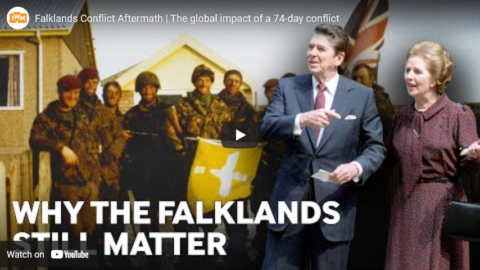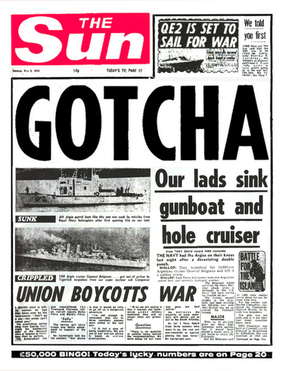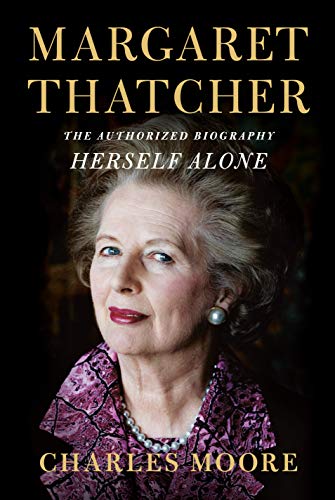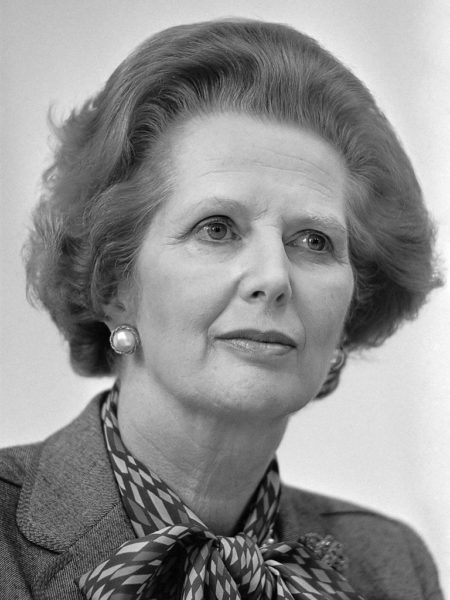Mrs Thatcher saved her country — and then went on to save an enervated “free world”, and what was left of its credibility. The Falklands were an itsy bitsy colonial afterthought on the fringe of the map, costly to win and hold, easy to shrug off — as so much had already been shrugged off. After Vietnam, the Shah, Cuban troops in Africa, Communist annexation of real estate from Cambodia to Afghanistan to Grenada, nobody in Moscow or anywhere else expected a western nation to go to war and wage it to win. Jimmy Carter, a ditherer who belatedly dispatched the helicopters to Iran only to have them crash in the desert and sit by as cocky mullahs poked the corpses of US servicemen on TV, embodied the “leader of the free world” as a smiling eunuch. Why in 1983 should the toothless arthritic British lion prove any more formidable?
And, even when Mrs Thatcher won her victory, the civilizational cringe of the west was so strong that all the experts immediately urged her to throw it away and reward the Argentine junta for its aggression. “We were prepared to negotiate before” she responded, “but not now. We have lost a lot of blood, and it’s the best blood.” Or as a British sergeant said of the Falklands: “If they’re worth fighting for, then they must be worth keeping.”
Mrs Thatcher thought Britain was worth fighting for, at a time when everyone else assumed decline was inevitable. Some years ago, I found myself standing next to her at dusk in the window of a country house in England’s East Midlands, not far from where she grew up. We stared through the lead diamond mullions at a perfect scene of ancient rural tranquility — lawns, the “ha-ha” (an English horticultural innovation), and the fields and hedgerows beyond, looking much as it would have done half a millennium earlier. Mrs T asked me about my corner of New Hampshire (90 per cent wooded and semi-wilderness) and then said that what she loved about the English countryside was that man had improved on nature: “England’s green and pleasant land” looked better because the English had been there. For anyone with a sense of history’s sweep, the strike-ridden socialist basket case of the British Seventies was not an economic downturn but a stain on national honor.
A generation on, the Thatcher era seems more and more like a magnificent but temporary interlude in a great nation’s bizarre, remorseless self-dissolution. She was right and they were wrong, and because of that they will never forgive her. “I have been waiting for that witch to die for 30 years,” said Julian Styles, 58, who was laid off from his factory job in 1984, when he was 29. “Tonight is party time. I am drinking one drink for every year I’ve been out of work.” And when they call last orders and the final chorus of “Ding Dong! The Witch Is Dead” dies away, who then will he blame?
During the Falklands War, the Prime Minister quoted Shakespeare, from the closing words of King John:
And we shall shock them: naught shall make us rue,
If England to itself do rest but true.For eleven tumultuous years, Margaret Thatcher did shock them. But the deep corrosion of a nation is hard to reverse: England to itself rests anything but true.
Mark Steyn, “The Uncowardly Lioness”, SteynOnline.com, 2019-05-05.
November 6, 2022
QotD: Thatcher and the Falklands
October 30, 2022
QotD: Thatcher’s legacy
… it was not the Labour Party’s tribunes of the masses who evicted her but the duplicitous scheming twerps of her own cabinet, who rose up against her in an act of matricide from which the Tory Party has yet to recover. In the preferred euphemism of the American press, Mrs Thatcher was a “divisive” figure, but that hardly does her justice. She was “divided” not only from the opposition party but from most of her own, and from almost the entire British establishment, including the publicly funded arts panjandrums who ran the likes of the National Theatre and cheerfully commissioned one anti-Thatcher diatribe after another at taxpayer expense. And she was profoundly “divided” from millions and millions of the British people, perhaps a majority.
Nevertheless, she won. In Britain in the Seventies, everything that could be nationalized had been nationalized, into a phalanx of lumpen government monopolies all flying the moth-eaten flag: British Steel, British Coal, British Airways, British Rail … The government owned every industry — or, if you prefer, “the British people” owned every industry. And, as a consequence, the unions owned the British people. The top income-tax rate was 83 per cent, and on investment income 98 per cent. No electorally viable politician now thinks the government should run airlines and car plants, and that workers should live their entire lives in government housing. But what seems obviously ridiculous to all in 2013 was the bipartisan consensus four decades ago, and it required extraordinary political will for one woman to drag her own party, then the nation, and subsequently much of the rest of the world back from the cliff edge.
Thatcherite denationalization was the first thing Eastern Europe did after throwing off its Communist shackles — although the fact that recovering Soviet client states found such a natural twelve-step program at Westminster testifies to how far gone Britain was. She was the most consequential woman on the world stage since Catherine the Great, and the United Kingdom’s most important peacetime prime minister. In 1979, Britain was not at war, but as much as in 1940 faced an existential threat.
Mark Steyn, “The Uncowardly Lioness”, SteynOnline.com, 2019-05-05.
October 4, 2022
QotD: “The world bought British and British was best”
So much has been promised in the past, so much has come to nothing, no wonder they are sceptical. And impatient. Already I can hear some of them saying: “The Conservatives have been in five months. Things do not seem to be that much better. What is happening? Do you think the Conservatives can really do it?” We say to them this: Yes, the Conservatives can do it. And we will do it. But it will take time. Time to tackle problems that have been neglected for years; time to change people’s approach to what Governments can do for people, and to what people should do for themselves; time to shake off the self-doubt induced by decades of dependence on the state as master, not as servant. It will take time and it will not be easy.
The world has never offered us an easy living. There is no reason why it should. We have always had to go out and earn our living — the hard way. In the past we did not hesitate. We had great technical skill, quality, reliability. We built well, sold well. We delivered on time. The world bought British and British was best. Not German. Not Japanese. British. It was more than that. We knew that to keep ahead we had to change. People looked to us as the front runner for the future.
Our success was not based on Government hand-outs, on protecting yesterday’s jobs and fighting off tomorrow’s. It was not based on envy or truculence or on endless battles between management and men, or between worker and fellow worker. We did not become the workshop of the world by being the nation with the most strikes.
I remember the words written on an old trade union banner: “United to support, not combined to injure”. That is the way we were. Today we still have great firms and industries. Today we still make much of value, but not enough. Industries that were once head and shoulders above their competitors have stumbled and fallen.
It is said that we were exhausted by the war. Those who were utterly defeated can hardly have been less exhausted. Yet they have done infinitely better in peace. It is said that Britain’s time is up, that we have had our finest hour and the best we can look forward to is a future fit for Mr Benn to live in. I do not accept those alibis. Of course we face great problems, problems that have fed on each other year after year, becoming harder and harder to solve. We all know them. They go to the root of the hopes and fears of ordinary people — high inflation, high unemployment, high taxation, appalling industrial relations, the lowest productivity in the Western world.
People have been led to believe that they had to choose between a capitalist wealth-creating society on the one hand and a caring and compassionate society on the other. But that is not the choice. The industrial countries that out-produce and outsell us are precisely those countries with better social services and better pensions than we have. It is because they have strong wealth-creating industries that they have better benefits than we have. Our people seem to have lost belief in the balance between production and welfare. This is the balance that we have got to find. To persuade our people that it is possible, through their own efforts, not only to halt our national decline, but to reverse it and that requires new thinking, tenacity, and a willingness to look at things in a completely different way. Is the nation ready to face reality? I believe that it is. People are tired of false dawns and facile promises. If this country’s story is to change we the Conservatives must rekindle the spirit which the socialist years have all but exhausted.
Margaret Thatcher, “Speech to Conservative Party Conference”, 1979-10-12.
June 4, 2022
Falklands Conflict Aftermath | The global impact of a 74-day conflict
Imperial War Museums
Published 1 Jun 2022The Falklands Conflict of 1982 only lasted for 74 days, but it had lasting consequences which continue to be felt today. Prior to 1982, Margaret Thatcher’s government was planning major defence cuts including withdrawing the military from the South Atlantic. Instead, they spent nearly £3 billion defending British sovereignty of the Falkland Islands, and to this day maintain a garrison there. What was the effect of this short conflict for Argentina, Britain and the Falkland Islands, and what impact did it have around the world?
Correction: The video states that Port Stanley was granted city status in 2002, this should be 2022.
Thanks for watching IWM’s 5 part series on the Falklands Conflict. Please like and subscribe for more, and let us know in the comments below what you’d like to see next.
Explore and licence the archive films in this video: https://film.iwmcollections.org.uk/c/…
CREDITS
Mount Pleasant images, Crown copyright, April 2022
Margaret Thatcher images © University of Salford Press Office
Landmine clearance photos via Safe Lane Global
Sound effects via ZapSplat
May 1, 2022
Sinking of the General Belgrano – Falklands War Documentary
Historigraph
Published 30 Apr 2022Go to https://squarespace.com/historigraph to get a free trial and 10% off your first purchase of a website or domain.
Falklands War series:
[1] Invasion of the Falklands https://youtu.be/BUYp3Wqz00A
[2] Recapture of South Georgia https://youtu.be/4mCZBpX4pxsTo help support the creation of more videos, consider supporting on Patreon:
https://www.patreon.com/historigraph#FalklandsWar #Historigraph #Belgrano
Come join the historigraph discord: https://discord.gg/ygypfs3BEB
Buy Historigraph Posters here! historigraph.creator-spring.com
This video was sponsored by Squarespace.
► Twitch: https://www.twitch.tv/historigraph
► Second Channel: https://www.youtube.com/channel/UCpIj…
► Twitter: https://twitter.com/historigraph
► Instagram: https://www.instagram.com/historigraphSources for the Falklands War Series (so far):
Max Hastings & Simon Jenkins, Battle for the Falklands
https://archive.org/details/battlefor…
Martin Middlebrook, Operation Corporate
Martin Middlebrook, Battle for the Malvinas
Mike Norman, The Falklands War There and Back Again: The Story of Naval Party 8901
Kenneth Privratsky, Logistics in the Falklands War
Sandy Woodward, One Hundred Days
Paul Brown, Abandon Ship
Julian Thompson, No Picnic
John Shields, Air Power in the Falklands Conflict
Edward Hampshire, The Falklands Naval Campaign 1982
Hugh McManners, Forgotten Voices of the Falklands
Cedric Delves, Across an Angry Sea: The SAS in the Falklands War
Rowland White, Vulcan 607
Vernon Bogdanor, “The Falklands War 1982” lecture https://www.youtube.com/watch?v=a9bWw…
Arthur Gavshon, The sinking of the Belgrano https://archive.org/details/sinkingof…
Gordon Smith, Battle Atlas of the Falklands War 1982 by Land, Sea and Air
http://www.naval-history.net/NAVAL198…
Hansard- https://api.parliament.uk/historic-ha…
Recording of Thatcher’s statement to the Commons is from https://www.youtube.com/watch?v=HvbhV…Music Credits:
“Rynos Theme” Kevin MacLeod (incompetech.com)
Licensed under Creative Commons: By Attribution 4.0 License
http://creativecommons.org/licenses/b…“Crypto” Kevin MacLeod (incompetech.com)
Licensed under Creative Commons: By Attribution 4.0 License
http://creativecommons.org/licenses/b…“Stay the Course” Kevin MacLeod (incompetech.com)
Licensed under Creative Commons: By Attribution 4.0 License
http://creativecommons.org/licenses/b…Other music and SFX from Epidemic Sound
April 4, 2022
The Falklands War — the first postmodern war or the last colonial war?
Dominic Sandbrook in UnHerd says Britain “needed the Falklands War”:
On the morning of Monday, 5 April 1982, the aircraft carrier Invincible slipped its moorings and eased into Portsmouth Harbour, bound for the South Atlantic. It was barely ten o’clock, yet the shoreline was packed with tens of thousands of flag-waving onlookers, singing and cheering for all they were worth, many of them in tears. From every building in sight flew the Union Jack, while well-wishers brandished dozens of homemade banners: “God Bless, Britannia Rules”, “Don’t Cry for Us, Argentina”. In the harbour, a flotilla of little boats, crammed with spectators, bobbed with patriotic enthusiasm. And as the band played and the ship’s horn sounded, red flares burst into the sky.
It is 40 years now since the outbreak of the Falklands War, one of the strangest, most colourful and most popular conflicts in British military history. Today this ten-week campaign to free the South Atlantic islands from Argentine occupation seems like a moment from a vanished age. But that was how it felt at the time, too: a scene from history, a colossal costume drama, a self-conscious re-enactment of triumphs past.
On the day the Invincible sailed, Margaret Thatcher quoted Queen Victoria: “Failure? The possibilities do not exist.” In the Sun, executives put up Winston Churchill’s portrait. And as the travel writer Jonathan Raban watched the departure of the Task Force on television, he thought it was like a historical pageant, complete with “pipe bands, bunting, flags, kisses, tears, waved handkerchiefs”. He regarded the whole exercise with deep derision, until the picture blurred and he realised that, despite himself, he was crying.
For many people the Falklands War was only too real. There were serious issues and genuine lives at stake, not just for the 1,813 islanders who had woken to find military vehicles roaring down their little streets, but for the tens of thousands of Argentine conscripts and British servicemen who were soon to be plunged into the nightmare of combat. And although polls suggest that about eight out of ten Britons strongly supported it, there were always those who considered it a mistake, a tragedy, even a crime. A certain Jeremy Corbyn thought it a “Tory plot to keep their money-making friends in business”. The novelist Margaret Drabble considered it a “frenzied outburst of dying power”. A far better writer, Argentina’s Jorge Luis Borges, famously called it “two bald men arguing over a comb”. That seems an odd analogy, though, for almost 2,000 blameless sheep farmers, who had no desire to be ruled by a junta that threw dissenters out of helicopters.
One common view of the Falklands campaign is that it was Britain’s last colonial war. But this strikes me as very unpersuasive. When we think of colonial wars, we think of wars of conquest by white men in pith helmets against brown-skinned underdogs. We think of embattled imperialists struggling to stave off a nationalist uprising, or fighting in defence of white settlers against a native majority. But the Falklands War was none of those things. There was no oppressed indigenous majority — except perhaps for the islanders themselves, some of whom had been there since the 1830s. As for the Argentines, their Spanish and Italian surnames were a dead giveaway. Indeed, few countries in the Americas had done a more thorough job of eliminating their original inhabitants.
April 2, 2022
Falklands War 82: How Argentina Seized the Islands
Historigraph
Published 31 Mar 2022For up to 60% off a subscription to Babbel, head over to https://bit.ly/historigraph_babbel
To help support the creation of the rest of the Falklands series, consider supporting on Patreon:
https://www.patreon.com/historigraphCome join the historigraph discord: https://discord.gg/ygypfs3BEB
Buy Historigraph Posters here! historigraph.creator-spring.com
This video was sponsored by Babbel.
► Twitch: https://www.twitch.tv/historigraph
► Second Channel: https://www.youtube.com/channel/UCpIj…
► Twitter: https://twitter.com/historigraph
► Instagram: https://www.instagram.com/historigraphSources for the Falklands War Series (so far):
Max Hastings & Simon Jenkins, Battle for the Falklands
https://archive.org/details/battlefor…
Martin Middlebrook, Operation Corporate
Martin Middlebrook, Battle for the Malvinas
Mike Norman, The Falklands War There and Back Again: The Story of Naval Party 8901
Kenneth Privratsky, Logistics in the Falklands War
Sandy Woodward, One Hundred Days
Paul Brown, Abandon Ship
Julian Thompson, No Picnic
John Shields, Air Power in the Falklands Conflict
Edward Hampshire, The Falklands Naval Campaign 1982
Hugh McManners, Forgotten Voices of the Falklands
Cedric Delves, Across an Angry Sea: The SAS in the Falklands War
Rowland White, Vulcan 607
Vernon Bogdanor, “The Falklands War 1982” lecture https://www.youtube.com/watch?v=a9bWw…
Arthur Gavshon, The sinking of the Belgrano https://archive.org/details/sinkingof…
Gordon Smith, Battle Atlas of the Falklands War 1982 by Land, Sea and Air
http://www.naval-history.net/NAVAL198…
Hansard – https://api.parliament.uk/historic-ha…
Recording of Margaret Thatcher’s statement to the commons is from https://www.youtube.com/watch?v=HvbhV…Music Credits:
“Rynos Theme” Kevin MacLeod (incompetech.com)
Licensed under Creative Commons: By Attribution 4.0 License
http://creativecommons.org/licenses/b…“Crypto” Kevin MacLeod (incompetech.com)
Licensed under Creative Commons: By Attribution 4.0 License
http://creativecommons.org/licenses/b…“Stay the Course” Kevin MacLeod (incompetech.com)
Licensed under Creative Commons: By Attribution 4.0 License
http://creativecommons.org/licenses/b…Other music and SFX from Epidemic Sound
From the comments:
Historigraph
1 day agoThis series has been about four months in the making, and is by far the most ambitious project I’ve set out to complete on Historigraph. It’s going to be 8 (possibly 9) videos over the next three months, charting the course of the Falklands War as it happened 40 years ago.
If you liked this video and want to help support the creation of the remaining seven videos, it would meant the world to me if you could consider supporting on Patreon https://www.patreon.com/historigraph, become a channel member, or even just share this video far and wide.
September 19, 2021
QotD: Gender stereotypes
Whenever I hear people stereotyping based on gender. “Women vote this way”, “Men act in this manner”, I am reminded of the great contrast between Britain’s two women Prime Ministers. Thatcher, won a brilliant renegotiation of the EEC, trounced the unions, denationalized vast swaths of obscene nationalized industries, and was one of the four people instrumental in ending the cold war. May, the other lady from number 10, apparently couldn’t negotiate the purchase of a sausage supper for fifty quid in the local fish and chip shop.
Apparently, it is more to do with the content of your character than the content of your underpants.
Fraser Orr, commenting at Samizdata, 2018-12-08.
July 29, 2021
QotD: An opera called Margaret
Margaret Thatcher had a great deal of time for Andrew Lloyd Webber. In August 1978, while she was still Leader of the Opposition, her speechwriter Ronnie Millar took her to see Evita. “It was a strangely wondrous evening yesterday leaving so much to think about,” she wrote to Millar the next day. “I still find myself rather disturbed by it. But if they [the Peronists] can do that without any ideals, then if we apply the same perfection and creativeness to our message, we should provide quite good historic material for an opera called Margaret in thirty years’ time!”
Dominic Sandbrook, The Great British Dream Factory, 2015.
February 24, 2021
QotD: Margaret Thatcher
I know I’m supposed to hate Margaret Thatcher. I know that someone with my politics is meant to detest her as a union-busting, milk-snatching, women’s-lib-baiting, Belgrano-sinking, Section-28-devising, society-destroying nightmare. I know that when Gillian Anderson was cast as Thatcher in series four of The Crown, I should have played up a shudder of disgust at Gillian Anderson, who is good, playing Thatcher, who is bad.
But here’s the thing: I don’t hate Thatcher. It’s not that I’m a huge fan of her legacy or anything (although anyone who thinks that industrial relations were doing fine before her or that the Falklands were some kind of unjustified expedition is clearly a fantasist), it simply doesn’t matter whether I like her or not because she is just too interesting.
Thatcher wasn’t the first woman to lead a country, but unlike her predecessors, Indira Gandhi in India or Isabel Martínez de Perón in Argentina, she didn’t arrive sanctified by a political dynasty. She was, as Prince Phillip snobbily points out to the Queen in The Crown, a grocer’s daughter. In real life, such condescension came strongly from the Left. The Blow Monkeys, one of the bands involved in the Red Wedge tour to support Labour, released an album called She was only a Grocer’s Daughter in 1987; and even though several pop songs fantasised about her death, that never seemed quite as ugly as supposed defenders of the working class announcing that Thatcher was just too common to rule.
Sarah Ditum, “How Thatcher rejected feminism”, UnHerd, 2020-11-15.
August 26, 2020
Sir Anthony Blunt, the “Fourth Man”
In The Critic, David Herman reviews a new book on the unmasking of Soviet spy … and close associate of the Royal family, Sir Anthony Blunt by Prime Minister Margaret Thatcher in 1979:
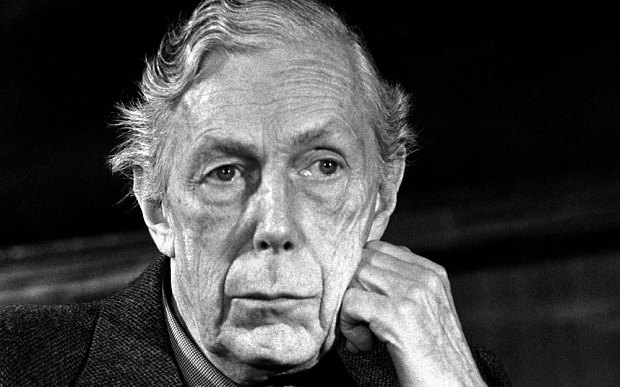
Anthony Blunt (1907-1983), was the “Fourth Man” in the Cambridge spy ring that supplied the Soviets with secret documents from within Britain’s WW2 intelligence services.
In November 1979, the newly elected Prime Minister, Margaret Thatcher, named Professor Sir Anthony Blunt, one of the most distinguished art historians in post-war Britain, as the “Fourth Man”, one of the traitors known as the “Cambridge Spies”, a group of spies working for the Soviet Union from the 1930s to at least the early 1950s. Mrs. Thatcher did not pull her punches. She regarded Blunt’s behaviour as “contemptible and repugnant”, and she was appalled by the evidence of treason and treachery at the heart of the British establishment.
What set Blunt apart from the others – Guy Burgess, Donald Maclean and Kim Philby – was his distinguished academic career. Blunt was professor of art history at the University of London, director of the Courtauld Institute of Art and Surveyor of the Queen’s Pictures. He was related to the Queen Mother. His students included such famous figures as Anita Brookner, Sir Nicholas Serota, Sir Neil Macgregor and Sir Alan Bowness. He also passed 1,771 documents to his Soviet spymasters during the war while working for MI5. For some of this time, the Soviet Union was a foreign enemy, allied to Nazi Germany.
The mix of homosexuality, 1930s Cambridge and treason, the scholar and the spy, made a compelling story and Blunt has been the subject of a famous essay in The New Yorker by George Steiner (“The Cleric of Treason”, 8 December, 1980), plays by Dennis Potter (Blade on the Feather, 1980), Alan Bennett (A Question of Attribution, 1988) and a novel by John Banville (The Untouchable, 1997). More recently, he has turned up in the third season of The Crown (2019), played by Samuel West. Had Alex Jennings not already played the Duke of Windsor in earlier series of The Crown, he would have been perfect casting.
After Mrs. Thatcher’s revelations in the House of Commons, Blunt was immediately stripped of his knighthood and he was subsequently forced to resign his Honorary Fellowship at Trinity College, Cambridge. The University of London, however, did not take away his Emeritus Professorship and the French government did not strip him of his Legion of Honour. There could be no criminal proceedings against Blunt because in 1964 he had only admitted his guilt in exchange for guaranteed immunity for any subsequent prosecution for the rest of his life.
The question then arose how should the British Academy respond? Blunt had been a Fellow for almost twenty years. He had served as a Vice-President and was talked of as a possible future President.
Almost immediately lines were drawn and leading figures like the historians John H. Plumb and A.J.P. Taylor threatened to resign from the Academy. It was a spectacular bunfight and the press had a wonderful time.
March 8, 2020
Britain’s Post-WWII Naval Decline
Sal Viscuso
Published 1 Dec 2013Max Hastings describes the declining British post-WWII role in global affairs.
February 10, 2020
The coup that toppled Margaret Thatcher
Charles Moore published the third volume of his Thatcher biography last year (I’ve read the first two volumes, but not the final one). In Quillette, Johan Wennström reviews the book:
This November will mark 30 years since former British Prime Minister Margaret Thatcher left office. After she had narrowly failed to secure an outright win in a 1990 leadership contest triggered by a challenge from Michael Heseltine, her former defense secretary, the majority of Thatcher’s Conservative cabinet colleagues withdrew their support and forced her departure following what she described as “eleven-and-a-half wonderful years.”
For Thatcher, the “coup,” as she referred to the events of 1990, had been unexpected. But as journalist Charles Moore explains in the third and final volume of his authorized Thatcher biography, Herself Alone (2019), the writing had been on the wall for some time. Thatcher’s style, which some considered abrasive, had turned senior figures against her. And many younger party members believed that if the party were to win a fourth consecutive election victory, in 1991 or 1992, it should be under a new standard-bearer (who turned out to be John Major).
An important underlying factor was the long-standing policy conflict regarding the European Community (or the EC as the European Union was then known), which pitted Thatcher against many in her own government, as well as against continental European leaders and George H. W. Bush’s White House. She was perceived as a “Cold Warrior” who was overly cautious in regard to the future of Europe, especially the project of European political and economic integration.
To some modern observers, that criticism of Thatcher remains apt. In a recently published book on international relations authored by former Swedish Prime Minister Carl Bildt, The Age of Disorder (Den nya oredans tid, 2019), Thatcher’s reluctance to endorse a speedy German reunification is attributed to her obsolete anxieties regarding “the dangers of a strong Germany.”
Moore’s latest volume, which focuses extensively on Thatcher’s views about Europe, shows her in a more nuanced light. In some ways, in fact, she was actually ahead of her time. And some of the current problems facing Europe, and the West more generally, might have been mitigated had her opinions been given a more generous audience.
Unfortunately, I don’t have the money for new hardcover books these days so I’ll have to wait until this volume gets a paperback edition or [shudder] get a library card and wait for it to show up at the local library.
June 8, 2019
QotD: Labour’s celebration at Thatcher’s death
A few hours after Margaret Thatcher’s death on Monday, the snarling deadbeats of the British underclass were gleefully rampaging through the streets of Brixton in South London, scaling the marquee of the local fleapit and hanging a banner announcing “THE BITCH IS DEAD”. Amazingly, they managed to spell all four words correctly. By Friday, “Ding Dong! The Witch Is Dead”, from The Wizard of Oz, was the Number One download at Amazon UK.
Mrs Thatcher would have enjoyed all this. Her former speechwriter John O’Sullivan recalls how, some years after leaving office, she arrived to address a small group at an English seaside resort to be greeted by enraged lefties chanting “Thatcher Thatcher Thatcher! Fascist fascist fascist!” She turned to her aide and cooed, “Oh, doesn’t it make you feel nostalgic?” She was said to be delighted to hear that a concession stand at last year’s Trades Union Congress was doing a brisk business in “Thatcher Death Party Packs” – almost a quarter-century after her departure from office.
Of course, it would have been asking too much of Britain’s torpid left to rouse themselves to do anything more than sing a few songs and smash a few windows. In The Wizard of Oz, the witch is struck down at the height of her powers by Dorothy’s shack descending from Kansas to relieve the Munchkins of their torments. By comparison, Britain’s Moochkins were unable to bring the house down: Mrs Thatcher died in her bed at the Ritz at a grand old age. Useless as they are, British socialists were at one point capable of writing their own anti-Thatcher singalongs rather than lazily appropriating Judy Garland blockbusters from MGM’s back catalogue. I recall in the late Eighties being at the National Theatre in London and watching the crowd go wild over Adrian Mitchell’s showstopper, “F**k-Off Friday”, a song about union workers getting their redundancy notices at the end of the week, culminating with the lines:
I can’t wait for That great day when F**k-Off Friday
Comes to Number Ten.You should have heard the cheers.
Mark Steyn, “The Uncowardly Lioness”, SteynOnline.com, 2019-05-05.
January 2, 2019
In non-breaking, non-news … politicians lie
Hector Dummond explains why what might seem like a shocking revelation from a former Thatcher MP isn’t even getting a raised eyebrow from the British media:
In a highly revealing article former MP Matthew Parris admits that the Conservative Party would often lie so that it could do what it wanted. And when it didn’t lie it fudged and avoided issues in order to prevent the ‘people’ having any say in the country’s governance:
our challenge was to find ways of ducking the issue. Once I became an MP, I did so by voting for the principle and against the practice. This subversion of democracy (in Theresa May’s phrase) caused me embarrassment, but not a second’s guilt. Sod democracy: hanging was wrong …
Among ourselves we talked cheerfully about subterfuge. The Britain of 1979 and 1983 most emphatically did not vote for a massive confrontation with the coal miners. We made sure the electorate was never asked.
These candid admissions have been completely ignored by the media. One reason they’ve been ignored is, of course, that most people have come to work this out for themselves, so Parris isn’t telling us anything we don’t already know. But surely hearing it from the horse’s mouth has great value? Why hasn’t the media splashed on this? Why haven’t Parris’s old enemies in the Labour party made hay with it?
The main reason is that most of the media, and virtually all the Labour party, is on his side over this. Even newspapers like the Guardian. You might think the Guardian would be the natural enemy of a former Tory MP, especially one who worked with Thatcher, and certainly on some issues they will regard Parris as an enemy, but the fact is that the Guardian wants government to be free of restraint by the people, because its vision of the state involves a leftist government getting into power, imposing its own ideology onto society and removing the power for the people to have a democratic say from most areas of life. So it can hardly criticise Parris for having done what it longs to do. It doesn’t want to bring about anything that might lessen the freedom government currently has to ignore the voter.

